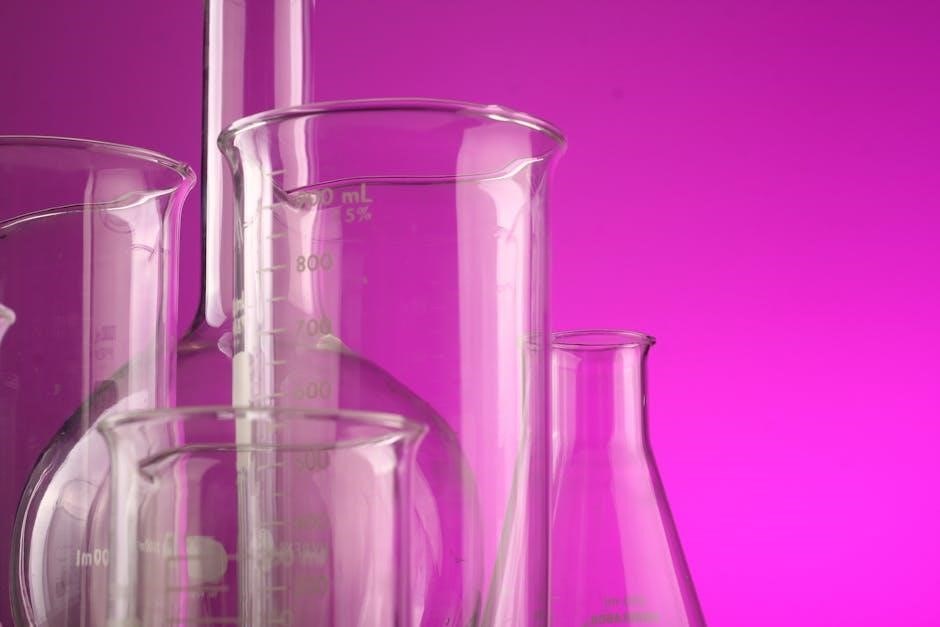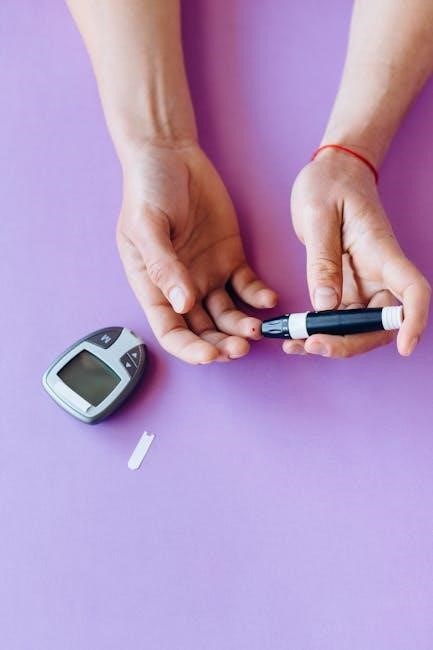CBT mock tests are practice exams designed to simulate real test conditions, helping candidates prepare for the actual exam. They typically feature 120 questions, covering various CBT topics, and are essential for building confidence and familiarity with the exam format. These tests allow learners to assess their knowledge, identify weaknesses, and refine their problem-solving skills in a timed environment, ensuring they are well-prepared for the actual CBT exam;
1.1 What Are CBT Mock Tests?
CBT mock tests are simulated practice exams designed to replicate the format and content of actual CBT (Cognitive Behavioral Therapy) certification exams. These tests typically consist of 120 multiple-choice questions, covering a wide range of topics related to cognitive behavioral therapy, such as cognitive restructuring, behavioral techniques, and ethical considerations. They are designed to help candidates familiarize themselves with the exam structure, timing, and question types. By taking mock tests, individuals can assess their knowledge gaps, improve problem-solving abilities, and build confidence in their understanding of CBT concepts. Mock tests also provide a platform to practice time management and test-taking strategies, ensuring candidates are well-prepared for the actual exam. These resources are widely available online, often in PDF formats, and are highly recommended for effective exam preparation.
1.2 Importance of Practicing with Mock Tests
Practicing with CBT mock tests is crucial for achieving success in the actual exam. These tests provide candidates with the opportunity to familiarize themselves with the exam format, question types, and time constraints. By simulating real test conditions, mock tests help reduce anxiety and build confidence. They allow learners to identify knowledge gaps, focus on weak areas, and refine their problem-solving skills. Mock tests also enable candidates to improve their time management, ensuring they can complete all questions within the allotted time. Additionally, they provide practical exposure to the types of scenarios and ethical dilemmas that may appear on the actual exam; Regularly practicing with mock tests helps candidates develop a strategic approach to answering questions and builds their overall readiness for the exam. This practice is essential for maximizing performance and achieving desired results in the CBT certification exam.
1.3 Overview of the 120-Question Format
The 120-question format is a comprehensive assessment tool designed to evaluate a candidate’s knowledge and application of CBT concepts and techniques. This format typically includes multiple-choice questions that cover a wide range of topics, from cognitive restructuring methods to ethical considerations in therapy. The questions are structured to test both theoretical understanding and practical problem-solving abilities. The 120-question format is often divided into sections, each focusing on specific areas of CBT practice, such as behavioral techniques, case studies, and ethical dilemmas. Time management is crucial, as candidates must answer all questions within a set time limit. This format mirrors real-world exam conditions, ensuring that candidates are adequately prepared for the challenges they will face. The extensive question bank provides a thorough evaluation of a candidate’s readiness to apply CBT principles in clinical settings effectively.

Structure of the CBT Mock Test
The CBT mock test is divided into sections, each focusing on specific skills like cognitive techniques, behavioral interventions, and ethical dilemmas. It includes 120 multiple-choice questions, timed to simulate real exam conditions, ensuring candidates can practice and improve their test-taking abilities effectively.
2.1 Question Types and Formats
The CBT mock test features diverse question types to assess various cognitive and practical skills. Multiple-choice questions dominate, requiring candidates to choose the correct answer from four options. Some questions focus on identifying ethical dilemmas, while others present case studies that test problem-solving abilities. Additionally, scenario-based questions evaluate the application of behavioral techniques and cognitive restructuring methods. The questions are structured to mirror real exam content, ensuring familiarity with the format. This variety ensures comprehensive preparation, addressing both theoretical knowledge and practical application. By practicing these question types, candidates can enhance their critical thinking and decision-making skills under timed conditions.
2.2 Time Management Strategies
Effective time management is crucial for success in the CBT mock test. With 120 questions to complete in a set duration, candidates must allocate time wisely. A common strategy is to spend approximately one minute per question, allowing for a buffer to review answers. Skimming through the entire test first can help identify easier questions, which should be answered immediately to secure quick points. For more challenging questions, allocating a slightly longer time frame prevents overthinking. Practicing under timed conditions during mock tests helps build stamina and reduces anxiety. Additionally, techniques like elimination of incorrect options can save valuable seconds. By mastering these strategies, candidates can efficiently navigate the test, ensuring they attempt all questions and maximize their scores. Regular practice with mock tests is essential to refine these time management skills and improve overall performance.

2.3 Scoring and Feedback Mechanisms
The scoring system for CBT mock tests is designed to simulate real exam conditions, providing a clear understanding of performance. Each question is typically worth a set amount of points, with the total score reflecting overall mastery of the material. Immediate feedback is often provided, highlighting correct answers and offering detailed explanations. Some platforms also include performance analysis, identifying strengths and weaknesses. Additionally, progress tracking features allow users to monitor improvement over time. Feedback mechanisms often include tips for further study and recommendations for reviewing specific topics. This structured approach ensures learners can pinpoint areas needing attention and focus their efforts effectively. By leveraging these tools, candidates can gain valuable insights into their readiness for the actual exam and refine their strategies for success.

Topics Covered in the CBT Mock Test

The CBT mock test covers essential topics like cognitive behavioral therapy concepts, behavioral techniques, cognitive restructuring, and ethical considerations; It ensures comprehensive preparation for the actual exam.
3.1 Cognitive Behavioral Therapy Concepts
Cognitive Behavioral Therapy (CBT) concepts form the foundation of the mock test, focusing on the relationship between thoughts, feelings, and behaviors. Key areas include cognitive restructuring, behavioral activation, and the identification of cognitive distortions. The test assesses understanding of how negative thought patterns contribute to emotional distress and how to challenge and modify them. It also covers the principles of learning theory, such as classical and operant conditioning, which underpin behavioral interventions. Additionally, the mock test evaluates knowledge of the cognitive-behavioral model, including the differentiation between automatic thoughts and core beliefs. These concepts are critical for developing effective treatment plans and are frequently tested in scenario-based questions. Mastery of these fundamentals ensures a strong grasp of CBT theory and its practical application in clinical settings. The questions are designed to simulate real-world challenges, helping candidates refine their problem-solving skills and clinical reasoning.
3.2 Behavioral Techniques and Applications
Behavioral techniques in CBT focus on modifying maladaptive behaviors through systematic interventions. The mock test evaluates understanding of techniques like exposure therapy, desensitization, and reinforcement strategies. These methods aim to reduce harmful behaviors and reinforce positive ones. Questions explore applications in various scenarios, such as treating phobias or habit disorders. The test also addresses behavioral activation, which helps individuals overcome depression by increasing positive reinforcement. Additionally, it covers the use of behavioral experiments to test hypotheses and challenge unhelpful beliefs. Understanding these techniques is crucial for effective therapy, and the mock test ensures candidates can apply them in diverse clinical contexts. The questions emphasize practical application, ensuring that candidates can translate theoretical knowledge into actionable treatment plans. This section is vital for assessing a candidate’s ability to implement evidence-based behavioral interventions effectively. Mastery here is essential for successful CBT practice and passing the exam.
3.3 Cognitive Restructuring Methods
Cognitive restructuring is a core CBT method aimed at identifying and modifying unhelpful thought patterns. The mock test assesses knowledge of techniques like cognitive challenging, thought recording, and cognitive-behavioral analysis. These methods help individuals recognize distortions, such as catastrophizing or black-and-white thinking, and replace them with balanced perspectives. Questions explore how to implement restructuring in various contexts, like treating anxiety or depression. The test also evaluates understanding of the role of homework assignments and self-monitoring in reinforcing cognitive changes. By addressing the theoretical underpinnings and practical applications, the mock test ensures candidates can apply restructuring effectively. This section is critical for developing therapeutic skills, as it directly impacts a client’s ability to manage emotions and behaviors. Proficiency in cognitive restructuring is a cornerstone of CBT competence, making it a key focus of the exam.
3.4 Ethical Considerations in CBT Practice
Ethical considerations are fundamental to CBT practice, ensuring therapists maintain professional standards and client trust. The mock test evaluates understanding of key ethical principles, such as confidentiality, informed consent, and boundary management. Questions address scenarios involving dual relationships, conflicts of interest, and cultural sensitivity. The test also covers ethical dilemmas, such as breaching confidentiality in risky situations or handling therapeutic relationships appropriately. Candidates are assessed on their ability to apply ethical frameworks, like those outlined in professional guidelines, to real-world cases. Understanding ethical codes, such as those from the NMC or other regulatory bodies, is crucial for safe and effective practice. The mock test helps identify gaps in ethical knowledge, ensuring therapists are prepared to navigate complex situations responsibly. This section emphasizes the importance of maintaining integrity and upholding client rights in therapy.

Sample Questions from the Mock Test
Sample questions in the mock test cover cognitive techniques, behavioral interventions, case studies, and ethical dilemmas, providing a comprehensive assessment of CBT knowledge and practical application skills.
4.1 Cognitive Techniques and Their Applications
Cognitive techniques, such as cognitive restructuring, are assessed through multiple-choice questions. These questions test understanding of how to identify and challenge negative thought patterns, promoting behavioral change.
4.2 Behavioral Interventions in Various Scenarios
Behavioral interventions are tested through scenario-based questions, assessing knowledge of techniques like exposure, reinforcement, and desensitization. These questions simulate clinical situations, such as addressing phobias or habit disorders, requiring application of CBT principles. Mock tests include questions on implementing behavioral activation for depression or using contingency management for substance use. They evaluate the ability to choose appropriate interventions and predict outcomes. Practice exams highlight common challenges, helping learners refine their approach to real-world cases. By engaging with these questions, candidates improve their clinical decision-making and confidence in applying behavioral techniques effectively. This section emphasizes practical application, ensuring readiness for diverse therapeutic scenarios. Regular practice enhances problem-solving and adaptability, crucial for successful CBT practice.

4.3 Case Studies and Practical Problem-Solving
Case studies in CBT mock tests present real-life scenarios, challenging candidates to apply theoretical knowledge to practical situations. These questions simulate clinical settings, such as treating anxiety disorders or managing depression, requiring the use of CBT techniques like cognitive restructuring or behavioral activation. Mock tests include detailed patient histories, symptoms, and treatment goals, asking candidates to formulate appropriate interventions and predict outcomes. This section assesses the ability to think critically and make ethical decisions, ensuring interventions align with CBT principles and patient needs. Regular practice with case studies enhances problem-solving skills, improving the ability to adapt interventions for diverse scenarios. Feedback from mock tests highlights areas for improvement, helping candidates refine their approach to complex cases and build competence in evidence-based practice.
4.4 Ethical Dilemmas in Therapy Settings
Ethical dilemmas in CBT mock tests present scenarios that challenge candidates to apply professional standards and moral reasoning. These questions often involve confidentiality, informed consent, or dual relationships, requiring adherence to CBT principles. Mock tests include situations like breaches of confidentiality, conflicts of interest, or cultural sensitivities, prompting candidates to choose appropriate actions. This section evaluates the ability to navigate complex ethical issues while maintaining patient trust and upholding legal standards. Regular practice with ethical dilemmas enhances decision-making skills, ensuring interventions align with professional guidelines and promote patient well-being. Feedback from mock tests helps identify gaps in ethical knowledge, enabling candidates to refine their approach and ensure compliance with therapy standards.

Preparing for the CBT Mock Test
Effective preparation involves consistent practice with 120-question mock tests, focusing on CBT concepts and ethical dilemmas. Utilize online resources, study guides, and analyze mistakes to improve understanding and test-taking skills.
5.1 Effective Study Strategies
Effective study strategies for the CBT mock test involve a structured approach to learning. Begin by understanding the exam format and content, focusing on cognitive behavioral therapy concepts, behavioral techniques, and ethical considerations. Allocate dedicated time for each topic, using study guides and online resources to deepen your knowledge. Practice with 120-question mock tests regularly to build familiarity with the exam structure and timing. Review each test to identify weaknesses, and concentrate on improving those areas. Additionally, engage in active learning techniques such as summarizing key points, creating flashcards, and discussing topics with peers. Consistency and thorough preparation are key to achieving success in the CBT mock test and the actual exam.
5.2 Utilizing Online Resources and Guides
Utilizing online resources and guides is a crucial part of preparing for the CBT mock test. Websites like Mentor Merlin and Prometric offer free or paid mock tests that simulate the actual exam environment, helping you get accustomed to the format. Platforms such as Embible provide practice questions and analysis tools to identify knowledge gaps. Additionally, online study guides and PDF materials, such as those offering 120-question practice exams, are invaluable for systematic preparation. These resources often include detailed explanations for correct and incorrect answers, enabling deeper understanding. Leveraging forums and discussion groups can also provide insights from others who have taken the test. By combining structured study materials with interactive online tools, you can enhance your learning experience and improve your readiness for the CBT exam.
5.3 Time Management During the Test
Effective time management is critical for success in the CBT mock test. With 120 questions to complete in a set timeframe, it is essential to allocate time wisely. Start by skimming through the entire test to assess the difficulty level and plan your approach accordingly. Allocate a fixed duration for each question, ensuring you do not spend too much time on a single question. Prioritize answering easier questions first to secure those points before tackling more challenging ones. For difficult questions, use logical guessing or elimination techniques to maximize your score. Keep track of the remaining time and adjust your pace as needed. Finally, reserve a few minutes to review your answers and make any necessary corrections. By maintaining a steady pace and staying focused, you can optimize your performance and ensure you complete the test within the allotted time.

5.4 Analyzing and Learning from Mistakes
Analyzing and learning from mistakes is a crucial step in improving your performance on the CBT mock test. After completing the test, review each question you answered incorrectly to understand where you went wrong. Pay attention to the concepts or topics you struggled with, as this will help identify knowledge gaps. Use the provided explanations or study materials to clarify any misunderstandings. Reflect on whether the error was due to a lack of knowledge or poor time management. Adjust your study plan to focus on these weaker areas, ensuring you thoroughly grasp the subject matter. Additionally, consider discussing challenging questions with peers or mentors to gain new insights. By systematically analyzing your mistakes, you can refine your approach, strengthen your weak points, and enhance your overall performance in future tests. This process fosters continuous improvement and builds confidence for the actual exam.

Benefits of Taking the CBT Mock Test
Taking a CBT mock test enhances familiarity with the exam format, identifies knowledge gaps, and improves time management and problem-solving skills. It boosts confidence and readiness for the actual test.
6.1 Building Confidence and Familiarity
Engaging in CBT mock tests significantly enhances your confidence and familiarity with the exam structure. By simulating real test conditions, these practice exams help you become accustomed to the question format, timing, and environment. This familiarity reduces anxiety and allows you to focus on demonstrating your knowledge effectively. Regularly taking mock tests builds a sense of preparedness, as you learn to navigate the exam confidently. The repetitive exposure to the test format ensures that you are not caught off guard by the layout or types of questions, enabling you to approach the actual exam with a calm and composed mindset. This confidence boost is crucial for performing at your best and achieving a successful outcome.
6.2 Identifying Knowledge Gaps
CBT mock tests are invaluable for identifying knowledge gaps, allowing you to pinpoint areas where you need improvement. By attempting questions across various topics, you can assess your understanding and recognize where your knowledge is lacking. The structured format of these tests mirrors the actual exam, ensuring that no critical areas are overlooked. After completing a mock test, you can analyze your performance to determine which concepts or topics require additional study. This targeted approach enables you to focus your efforts on weaknesses, ensuring comprehensive preparation. Regularly taking mock tests helps you track your progress over time, allowing you to address gaps systematically. By identifying and addressing these gaps, you can build a stronger foundation of knowledge and feel more prepared for the actual exam.
6.3 Improving Test-Taking Skills
CBT mock tests are an excellent tool for improving test-taking skills, as they simulate the actual exam environment. By practicing with 120 questions, you become familiar with the format, timing, and structure of the test. This helps you develop strategies to manage your time effectively, ensuring you can attempt all questions without rushing. Mock tests also allow you to refine your approach to different question types, such as multiple-choice or scenario-based questions. Additionally, analyzing your performance after each mock test helps you identify patterns in your mistakes, enabling you to adjust your test-taking techniques. Regular practice builds your ability to stay calm and focused under pressure, which is crucial for performing well in the actual exam. Over time, these skills become second nature, boosting your confidence and overall test-taking abilities.
6.4 Enhancing Problem-Solving Abilities
CBT mock tests play a significant role in enhancing problem-solving abilities by exposing candidates to a wide range of clinical scenarios and complex questions. The 120-question format challenges learners to think critically and apply their knowledge of cognitive behavioral therapy concepts to real-world situations. Regular practice with mock tests helps improve analytical thinking, as candidates learn to identify the most appropriate answers and justify their reasoning. Additionally, mock tests often include case studies and ethical dilemmas, which require a deeper understanding of CBT principles and their practical applications. By repeatedly solving these problems, candidates develop a sharper ability to evaluate information, weigh options, and make sound decisions under time constraints. This skill is not only beneficial for the exam but also enhances their professional competence in applying CBT techniques effectively.
CBT mock tests are invaluable for exam preparation, helping candidates assess their knowledge and build confidence. Regular practice with mock tests ensures readiness for the actual exam, fostering success.
7.1 Final Tips for Success
To excel in your CBT mock test, stay calm and focused during practice. Regularly review study materials and practice under timed conditions to build endurance. Analyze mistakes to improve understanding and retention. Prioritize topics where you need more preparation and seek clarification on complex concepts. Utilize online resources, such as mock tests and study guides, to enhance your preparation. Maintain a consistent study schedule and ensure adequate rest before the test. Familiarize yourself with the exam format to avoid surprises. Trust your preparation and approach each question confidently. Remember, consistent practice and a positive mindset are key to achieving success in your CBT mock test and beyond.
7.2 Encouragement to Continue Practicing
Consistent practice is key to mastering the CBT mock test format. Encourage yourself to dedicate time daily to review concepts and take practice tests. Celebrate small achievements, like improving your score or understanding complex topics. Surround yourself with supportive resources, such as study groups or online communities, to stay motivated. Remember, every effort brings you closer to your goal. Embrace challenges as opportunities to grow and refine your skills. Keep a positive mindset and remind yourself of the progress you’ve made. Persistence and dedication will ultimately lead to success in your CBT exam. Stay committed, and trust that your hard work will pay off when you face the actual test.
